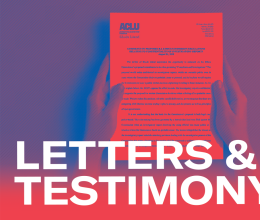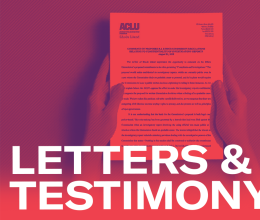The City of Providence has agreed to pay $75,000 to settle an ACLU lawsuit involving the violation of the free speech rights of a local resident three years ago when she was barred from peacefully leafleting in front of a building where then-Mayor David Cicilline was speaking.
Under the agreement signed today by U.S. District Judge William Smith, the City acknowledged that it “unconstitutionally interfered” with Judith Reilly’s right to distribute flyers on a public sidewalk adjacent to the Providence Career and Technical Academy where Cicilline was scheduled to give his annual “State of the City” address, and also agreed to pay Reilly $500 in damages for violation of her rights and $74,500 in costs and attorneys’ fees.
The incident took place in February 2010, when Reilly was handing out the flyers, prepared by the Olneyville Neighborhood Association, which were critical of a Mayoral appointee. While leafleting, Reilly was confronted by two police officers who ordered her to move across the street or else face arrest. She reluctantly moved, but then returned to the front of the auditorium, where she was confronted by two other officers who again ordered her to move. She complained that doing so would prevent her from handing flyers to her intended audience – people entering the auditorium – thus largely defeating the purpose of the activity. However, after again being threatened with arrest, she moved back across the street. ACLU volunteer attorney Richard A. Sinapi filed suit on her behalf later that year to challenge the police officers’ actions.
Reilly said today: “My constitutional rights are priceless, and I’m grateful to the ACLU and Mr. Sinapi for defending them. I will never understand why Mayor Taveras chose to spend so much public money defending the indefensible. I hope that he and the Police Department learned something from this case, but I fear they have not.”
RI ACLU attorney Sinapi added: “Ms. Reilly's peaceful leafleting represented a time-honored method for sharing political views with other members of the public. It is disconcerting that purportedly well-trained police officers in a large municipal police department like Providence could be unaware that banning such activity violated First Amendment rights—particularly since two of the officers involved in the suit have law degrees. This lack of informed judgment apparently also extends to the city officials who refused the opportunity to amicably resolve this matter for a fraction of the money the City now has to pay. This decision will hopefully ensure that citizens exercising free speech rights in Providence will not be subjected to unreasonable restrictions in the future.”
In opposing the ACLU’s suit, the City’s major argument for ordering Reilly to move was a supposed concern for keeping the sidewalk clear in case of the need for an emergency evacuation from the building. But in a ruling issued earlier this year, Judge Smith noted: “There is no evidence in the record, beyond Defendants’ bald assertions, that Plaintiff’s presence in this area would have posed a hazard in the event of a mass evacuation. Additionally, because leafleters are only marginally more obstructive than other pedestrians, Defendants’ decision to ban only Plaintiff and her companion from the lower sidewalk while allowing all other pedestrians access to that same stretch of sidewalk undermines the credibility of their purported public safety justification.”
The judge said it was unclear whether the police banned Reilly from leafleting because of the specific content of her flyer, criticizing the Mayor, or because of a more general unconstitutional “custom of clearing vast public spaces in order to keep exit passageways open.” As a result, he was unable to determine whether the defendants could be held individually liable for their conduct, or whether only the City was liable due to its unconstitutional policy. He therefore ordered a trial to ascertain liability. The settlement reached by the parties obviates the need for that trial.






